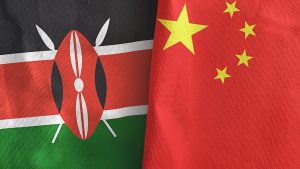On August 9, Kenya held general elections for various seats, including president, in accordance with the 2010 constitution, with the presidential election closely contested. The chairman of Kenya’s Independent Electoral and Boundary Commission (IEBC), though disowned by four commissioners, eventually declared William Ruto the president-elect, having attained 50.48 percent of total votes cast, followed closely by Raila Odinga at 48.8 percent and the remaining two candidates at 0.72 percent.
The change in government could have huge implications for Chinese investment in the country.
Kenya was the third African country to sign on to Belt and Road Initiative (BRI) after South Africa and Egypt. Since Kenyan President Uhuru Kenyatta signed the BRI agreement in May 2017, Chinese entities have both financed and constructed massive infrastructural projects across Kenya. These include the Standard Gauge Railway, which connects the port of Mombasa, Nairobi City, and the Inland Dry Port in Naivasha Town; an upgrade of the Mombasa port; the construction of Lamu deep sea port; and the development of the Naivsaha inland dry port.
Despite promises that economic growth would radiate outward from this infrastructure investment into secondary and tertiary industries, Kenya’s rising debt burden, particularly debt owed to China Exim bank, has come to overshadow the projects. Kenya’s existing stock of borrowing is projected to pass $56 billion by September, with China the single largest bilateral lender to the country. The incoming Ruto regime must now spend over $30 million a day to service Kenyan debt taken out by the previous government.
Incoming governments inheriting foreign debt is standard; however, the opacity of some of the deals inked by the outgoing regime mean the transition in Kenya-China geoeconomic relations is unlikely to be smooth. The Kenyan Parliament has already ordered a National Assembly review of the clause that attaches the port of Mombasa as collateral in a $3 billion loan contract with China. The Public Investment Committee in an exit report tabled before the 12th Parliament indicated that the loan agreement is skewed against the Kenya Ports Authority (KPA) and recommends renegotiation of the entire loan to discharge the KPA, replacing Kenya Railways Corporation as the contractor.
The crux is that the loan repayment agreement lists the KPA as borrower and therefore liable to repay the loan owed to China Exim Bank in case of default. But the state corporation indicates it does not have the legal capacity to hold sovereign authority and therefore could not plead sovereign immunity. The Public Investment Committee report even states that the KPA does not have copies of the preferential credit loan agreement, since it was not party to the loan agreements. Moreover, the report notes that the placement of the KPA in the payment of the loan was done without approval of the KPA board, its parent, the Ministry of Transport, or the Cabinet.
Outgoing President Uhuru Kenyatta and leading government officials have in turn defended his regime against any accusations of malpractice, citing economic gains and jobs created due the Chinese infrastructure projects. Before the election, Kenyatta likened Kenya’s indebtedness with South Korea’s economic miracle, arguing that South Korea became, at the height of its industrialization process, the fourth-most indebted country in the world.
However, President-elect Ruto has specifically accused Kenyatta and his regime of abetting state capture, arguing that Kenyatta’s family members are immediate beneficiaries of Chinese development finance. Upon taking office, Ruto has promised to take far-reaching measures to address the situation, hinting that he will review existing loan contracts and agreements to ease the country’s rising debt burden. He has also floated the idea of the relocating operations of the Naivasha dry port to Mombasa, blaming rising unemployment in the coastal region on the inland port. He also promised that the new government will give more voice to locals with regard to the operations of Mombasa and Lamu ports.
Besides debt, corruption, and unemployment, the Kenyan electorate is also concerned with the use of Chinese laborers on BRI projects, even in areas which Kenya has competency. The already poor working conditions of locals are exacerbated by the displacement of informal sector workers along project corridors. There is a general feeling that the outgoing government has failed to addressed these concerns adequately. One local trade unionist argued that Kenya, like other African governments, is hesitant to address issues of labor relations for fear of capital flight by foreign investors.
Ruto now faces the reality of actually addressing these concerns as promised during the campaign. Three possible scenarios emerge: maintaining the status quo set by his predecessor, which implies continuing the BRI projects with the support of the Chinese government; renegotiating the terms of engagement with Beijing in order to address the debt question and other contractual arrangements and addressing workers’ conditions to guarantee more inclusive economic growth; or disengaging or downscaling Kenya’s level of engagement with China under the BRI and instead looking for an alternative partner to continue building Kenya’s future, but with better terms and conditions.
Each scenario has far-reaching implications at both local and international levels. The extent to which Ruto will fulfil his promises to rethink BRI-related projects, though, will depend on how he balances these conflicting factors. Past experience shows that new regimes often start with a resolve for transformative change but gradually backtrack to the status quo, or worse.
Given the complexity of governance and the underlying political economy, incentives for a radical departure into good governance beyond early campaign promises are weak. Considering the BRI projects presented opportunities for aggrandizement to his predecessor, new forms of good national governance emerging from within Kenya seem less likely than the future development of deeper dimensions of foreign state geoeconomic leverage.

































